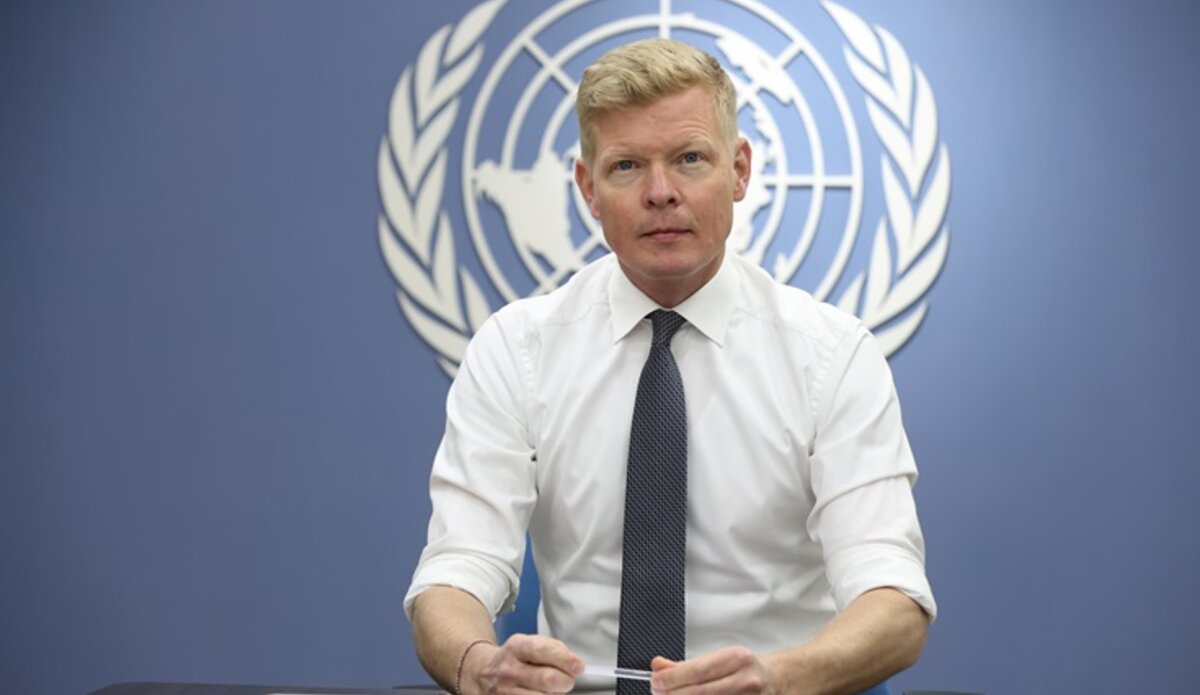Special Envoy Hans Grunberg’s interview with Al Mushahid
Waheeb Al Nosari: How would you characterize the current situation in Yemen in light of the recent developments?
UN Special Envoy Hans Grundberg: Yemen is still reeling from ten years of conflict and millions of Yemenis are struggling under the weight of prolonged hardship. Regional developments, particularly in the Red Sea and the broader Middle East, including the tragedy in Gaza, attacks by Ansar Allah on commercial shipping and US airstrikes are increasing the risk of further escalation and complicating mediation efforts.
While the 2022 truce succeeded in halting the heavy fighting at the time and has prevented it so far from resuming, it has not translated into lasting peace. We still see sporadic shelling, drone attacks, and troop mobilizations.
In addition, the weaponization of the economy has inflicted deep and indiscriminate harm on most Yemenis and the situation keeps getting worse. This is not only unacceptable but a direct assault on the dignity and daily survival of Yemen's civilian population. Yemeni men, women and children must be allowed to live their lives with all their citizens’ rights of health, work, education, freedom of movement and expression respected and protected.
Despite these challenges, I am convinced that a negotiated political settlement remains the most viable, sustainable and pragmatic way to achieve these aims. To this end, I am continuing to work with the parties, as well as regional and international partners. It is of utmost importance that space for dialogue is preserved and that the parties commit to de-escalation and re-engage constructively with peace efforts—just as they have done several times in the past, most recently in achieving the 2022 truce and the 2023 commitments for a roadmap.
Al Nosari: What are the latest developments in the mediation efforts you are leading, have the priorities changed? What are the main obstacles to achieving tangible progress toward peace?
Grundberg: The obstacles are considerable. Deep mistrust and escalatory rhetoric from the parties, cycles of retaliatory attacks compounded with regional volatility, particularly in the Red Sea for the past eighteen months, risk undermining the relative calm within Yemen and have shrunk the mediation space.
That said, the overarching priorities - repeatedly and consistently voiced by Yemenis are unchanged. These priorities, which the parties have acknowledged and committed to, include a lasting ceasefire with credible security arrangements, urgent economic steps — paying civil servant salaries and ensuring fuel is accessible —and a political process which brings Yemenis together to shape their future. The United Nations is here to help realize this vision, with Yemenis at the center of every conversation. To this end, my engagement, with the support of my office, is taking place at multiple levels—both diplomatic and technical—across the political, economic, and security tracks, as well as with the regional and international actors. For example, we have been engaging political parties, civil society, women, youth, and underrepresented groups to make sure the peace process reflects Yemen’s diversity and local realities.
On the security front, my office has been working through the Military Coordination Committee – a platform created during the 2022 truce - to reduce tensions and avoid a slide back into full-scale conflict.
On the economy, we’re working with all sides to prevent further collapse by proposing steps, like reopening roads to lower transport costs, stimulating the economic activity, and increasing purchasing power, especially critical as seventy percent of Yemenis live in poverty, with women being the most affected. We’re also exploring technical solutions to help support the independence of the central bank. A peace scenario, built on a ceasefire and economic settlement, could additionally restore oil and gas exports and attract vital investment.
This may sound like a distant future and I am under no illusions about the difficulty of the road ahead. But I remain committed to turning these priorities into practical steps that move Yemen closer to lasting peace.
Al Nosari: Following the U.S. designation of the Houthis as a Foreign Terrorist Organization, how will this classification impact the peace process in Yemen? And do we expect a new round of UN-led dialogue between the parties?
Grundberg: To be clear, the recent U.S. designation is a sovereign decision and its full implications, both political and humanitarian, are still unfolding. As I have said many times before, however, is that Yemen’s conflict will not be resolved through unilateral measures but rather through negotiations held in good faith and with the support of a coordinated international community. Only an inclusive political process can chart a viable path forward. On the United Nations’ part, we are continuing to engage with the parties, the region, and the international community on the core issues.
Al Nosari: With regard to the developments in the Red Sea and Bab al-Mandab and the actions of the Houthis there, are these issues part of the negotiations between Yemeni parties, or are they being treated as a separate matter? And to what extent have the U.S. strikes on the Houthis impacted the peace process in Yemen?
Grundberg: I have repeatedly warned against escalatory actions and the abandonment of dialogue, as this only adds pressure to an already fragile situation. As we have recently seen with strikes resulting in civilian deaths in Ras Isa, ordinary Yemenis are, as always, paying the price of war. Moreover, these developments don’t just affect international trade routes, but they also carry real consequences for Yemen’s internal stability and risk pulling the country further into regional confrontation.
While the escalation in the Red Sea and strikes by the United States are not formally part of the Yemeni-Yemeni negotiations, it is becoming more difficult to separate the internal dynamics from the regional tensions. Solution-oriented dialogue is therefore urgent, and for this reason, I am calling not only for restraint and de-escalation but also for credible long-term guarantees that protect the Red Sea from becoming a prolonged arena of conflict. Such assurances are essential—not just for maritime security, but to keep Yemen from sliding further away from peace.
Al Nosari: Many Yemenis have lost hope in the UN-led peace process and no longer trust the role of the United Nations in Yemen, as they feel it has not achieved anything tangible in their lives and their suffering continues due to the ongoing war. How do you respond to this perception?
Grundberg: I’ve heard these concerns directly, and I take them seriously. I deeply understand the frustration and exhaustion felt by Yemenis after more than a decade of conflict. The truth is that this process was never going to be quick or easy. But I want to emphasize that while a comprehensive peace has not been achieved yet, some achievements show what is possible. The 2022 UN-brokered truce led to a sharp drop in violence and civilian casualties, and improved humanitarian access. It wasn’t perfect, but its impact was and continues to be real. The release of nearly nine-hundred conflict-related detainees in 2023 allowed families to reunite after years of separation. The commitments made by the parties in 2023 signaled another step forward, showing that dialogue is still possible, even in difficult conditions.
Still, I know that these steps haven’t translated into the tangible change Yemenis need in their daily lives. That’s exactly why my focus has remained on achieving concrete progress toward a lasting ceasefire, real economic relief – including through measures that the parties can take immediately, and a political process that reflects the voices of all Yemenis. I am committed to work for real change on the ground which proves that the UN remains a partner Yemenis can count on.
For this to work, the parties must engage in good faith, and demonstrate the courage and political will required to move forward. I do not have the power to stop any party from engaging in war if that is what they really want. However, I will always remain available for active solution-making towards a negotiated settlement.
Al Nosari: What mechanisms do you propose to ensure a permanent ceasefire, and how can trust be built between the conflicting parties in light of recent regional developments, particularly the Red Sea crisis?
Grundberg: A lasting, nationwide ceasefire, agreed and respected by all is a unanimous demand of Yemenis, and the parties committed to it back in December 2023. Any ceasefire, while an important step toward peace must be built on trust in order to be sustainable. We have seen in our consultations —with military actors, political groups, civil society, women, and youth—that trust can be built over time through steady engagement, reciprocal actions, and keeping lines of communication open.
My office continues to engage senior security actors and to facilitate discussions to prepare for a nationwide ceasefire once we are able to move forward. The communication channels that were built during the truce — particularly through the Military Coordination Committee - are still active, and they’re key to avoiding misunderstandings and preventing escalation.
In a future ceasefire but also in our current efforts, practical steps such as opening roads and creating space for military representatives to meet, talk, and resolve perceived threats face-to-face are essential. Yemenis have long relied on local dispute resolution, the sustainability of which we also want to support.
Finally, and importantly, no ceasefire will hold without strong international backing. Regional and international guarantees are essential. Unity in the Security Council matters, as does support from regional actors such as Saudi Arabia, UAE, and Oman, who have to date been hugely important in supporting the UN’s efforts in this regard, and who can help manage tensions on the ground and support implementation. Close interaction with Iran on this issue will also be important.
Al Nosari: Given the rapid developments in Yemen and the Arab and regional landscape could you update us on the status of the UN-backed roadmap?
Grundberg: In late 2023, the parties agreed on a set of commitments—a nationwide ceasefire, measures to address urgent economic and humanitarian issues, and to begin preparing for an inclusive political process. The UN was asked to help operationalize those commitments and structure a path forward through a UN roadmap. To me, it does not matter if we label this set of commitments as a ‘roadmap’ or by another name, as I am convinced that Yemen will need a ceasefire, economic recovery, and a political process in order to move forward and rebuild.
Regional escalation, particularly in the Red Sea, has complicated the environment and hampered progress, but if anything these developments have reinforced how urgently Yemen needs a political path forward.
Al Nosari: Several UN national staff remain detained by Ansar Allah in Sana’a. What is your position on this, and how does the situation affect the UN’s work and credibility in Yemen?
Grundberg: This is deeply personal—for me, for my team, and especially for the families of our detained colleagues. The arbitrary and prolonged detention of UN staff — as well as colleagues from international and national NGOs, civil society, and diplomatic missions— by Ansar Allah is not only unlawful, it is cruel. These are people who have dedicated their lives to helping others, and they should be home with their families. The death of our colleague Ahmed, a WFP staff member, while in custody was unacceptable. His family should never have had to mourn him under these circumstances. These detentions send a chilling message to those trying to support Yemenis, and it seriously undermines our ability to operate.
The United Nations from the Secretary-General to all impacted UN agencies are actively engaged on this matter. I have consistently pushed for their releases in my engagements, including with senior Ansar Allah officials, regional actors and in Security Council members.
While I am glad about the recent release of a staff member from the Dutch Embassy through Omani mediation, it goes without saying that this step alone is not sufficient. Hundreds of family members are still waiting to be reunited with their loved ones, many of whom have exhausted every possible avenue to make that a reality. The UN Secretary-General has made repeated clear calls for the immediate and unconditional release of all remaining UN, diplomatic, and civil society personnel. We are doing everything in our power to secure their release. I hope Ansar Allah will act with reason and responsibility and take the necessary steps to bring this unacceptable situation to an end.
Al Nosari: Why has the UN’s stance on including women in the peace process weakened compared to the stronger emphasis during the terms of previous envoys to Yemen?
Grundberg: I appreciate the question, but I’d respectfully challenge the premise that our stance has weakened. My commitment to women’s inclusion in Yemen’s peace process remains steadfast. Women’s participation is essential, given their disproportionate burden in the conflict and their critical role in peacebuilding. Our message has been consistently clear to all parties that we’re not just maintaining but scaling up inclusive efforts to ensure women’s full and equal participation in the peace process across all areas.
My office has engaged hundreds of Yemeni stakeholders— including women, youth, tribal leaders, and marginalized groups— through initiatives like “A bottom-up vision for an inclusive peace process” in several places inside and outside Yemen, through digital and in-person dialogues, focus groups, and outreach campaigns to ensure that women are not only present but are actively influencing decisions and outcomes in all three tracks. For example, in February, we convened Yemeni businesswomen to hear their voices and understand what is holding them back. We have integrated women’s perspectives directly into the political dialogue process, intentionally designed to ensure women’s active and substantive role. In parallel, our engagement with civil society organizations has included women-led and women-focused groups, ensuring that local actors—especially those working on the frontlines—are shaping both the agenda and the process.
Al Nosari: Does the United Nations possess any pressure tools over the various parties obstructing the peace process? If so, what are they?
Grundberg: The UN’s strength lies in its impartiality and convening power, not in coercive tools. We don’t wield direct pressure through sanctions or military force; our influence comes through dialogue, moral authority, and the ability to rally international consensus behind sustainable solutions. We use these to urge parties toward peace and do so in coordination with member states whose leverage, economic incentives, and diplomatic tools complement those of the UN.
Ultimately, the true momentum for peace lies with Yemenis themselves, and our role is to support and guide that aspiration into a process that the parties agree on.
Al Nosari: Finally, we thank the UN Special Envoy to Yemen, Mr. Hans Grundberg, for answering our questions. Would you like to add anything in closing?
Grundberg: Thank you for this opportunity. I’d just add this; Yemenis have endured unimaginable hardship, yet their resilience inspires me daily. To them, I say we see you, we hear you, and we won’t relent in our efforts to support your aspirations for peace.
To the parties, I urge them to be courageous and to choose dialogue over division, for Yemen’s sake. And to the regional and international communities, let’s not turn away; Yemen’s future matters to us all.
My team and I will continue tirelessly to support Yemenis to achieve peace, we can turn this long chapter of conflict into one of hope and renewal.
Thank you.
 UN
UN







